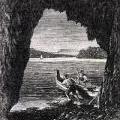 Smuggling has been a problem in the Eastern Townships for a long time. At first, there were no customs offices at all. People could buy whatever they pleased in the U.S. and bring it back over the border, no questions asked. In 1821, the government set up a border post at Stanstead. Some people paid the duty, but many continued to smuggle. Those caught faced harsh penalties, such as the seizure of their vehicle.
Smuggling has been a problem in the Eastern Townships for a long time. At first, there were no customs offices at all. People could buy whatever they pleased in the U.S. and bring it back over the border, no questions asked. In 1821, the government set up a border post at Stanstead. Some people paid the duty, but many continued to smuggle. Those caught faced harsh penalties, such as the seizure of their vehicle.
Each customs post was run by a "collector", whose job was to collect the duty from people importing goods to Canada. Working for him were "preventive officers". Paid little or no salary, preventive officers received a share of the proceeds from seized goods. Their job was apprehending smugglers, which was dangerous and which made them unpopular. They sometimes had to chase smugglers on foot in the middle of the night through the woods, on horseback down lonely dark roads, or by boat down the cold, rough waters of Lake Memphremagog.
There are many tales of smuggling in the Eastern Townships. Some smugglers are legendary. Uriah Skinner, it is said, was the greatest smuggler of all. Skinner, the story goes, used to sail up and down Memphremagog with his contraband. He was so crafty and his boat so fast that no one could catch him. It is said that he used to hide out in a cave on an island, and that he died there while hiding from customs men. All that was ever found of him were his bones.
Often the smugglers escaped. Sometimes it was the customs men who were caught by the smugglers: they were beaten; their heads were shaved; and occasionally they were tarred and feathered. James Thompson, a collector who hated his job on the frontier, complained in 1851 that Stanstead was a place "where smuggling is popular and the population is shrewd and lawless and ever willing to aid smugglers.
Today, smuggling isn't what it used to be. Customs officers are better organized, better equipped, and paid regular salaries. Most border crossings are monitored, and the Townships are not the frontier they once were.